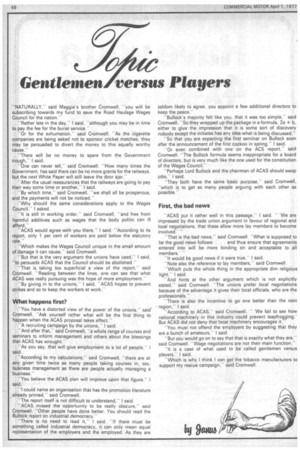Gentlemen versus Players
Page 50

If you've noticed an error in this article please click here to report it so we can fix it.
"NATURALLY," said Maggie's brother Cromwell, you will be subscribing towards my fund to save the Road Haulage Wages Council for the nation."
"Rather late in the day,' I said, "although you may be in time to pay the fee for the burial service.
-Or for the exhumation," said Cromwell. "As the cigarette companies are being asked not to sponsor cricket matches, they may be persuaded to divert the money to this equally worthy cause.'
"There will be no money to spare from the Government trough," I said.
"One can never tell," said Cromwell. "How many times the Government, has said there can be no more grants for the railways, but the next White Paper will still leave the door ajar."
"After the usual reassurances that the railways are going to pay their way some time or another," I said.
"By which time," said Cromwell, "we shall all be prosperous, and the payments will not be noticed."
"Why should the same considerations apply to the Wages Council," I asked.
"It is still in working order," said Cromwell, "and free from harmful additives such as wages that the body politic can ilL afford.'' "ACAS would agree with you there," I said. "According to its report, only 1 per cent of workers are paid below the statutory rate."
"Which makes the Wages Council unique in the small amount of damage it can cause," said Cromwell.
"But that is the very argument the unions have used," I said, "to persuade ACAS that the Council should be abolished.
"That is.taking too superficial a view of the report," said Cromwell. "Reading between the lines, one can see that what ACAS was really pursuing was the hope of more employment."
"By giving in to the unions," I said, "ACAS hopes to prevent strikes and so to keep the workers at work.''
What happens first?
"You have a distorted view of the power of the unions,said' Cromwell. "Ask yourself rather what will be the first thing to happen when the ACAS proposal takes effect."
"A recruiting campaign by the unions," I said.
"And after that," said Cromwell, "a whole range of courses and seminars to inform management and others about the blessings that ACAS has wrought."
"As you say, that will give employment to a lot of people," I said.
-According to my calculations," said Cromwell, "there are at any given time twice as many people taking courses in, say, business management as there are people actually managing a business."
"You believe the ACAS plan will improve upon that figure," I said.
"I could name an organisation that has the promotion literature already printed," said Cromwell.
"The report itself is not difficult to understand," I said.
"ACAS missed the opportunity to be really obscure," said Cromwell. "Other people have done better. You should read the Bullock report on industrial democracy."
-There is no need to read it," I said. "If there must be something called industrial democracy, it can only mean equal representation of the employers and the employed. As they are Seldom likely to agree, you appoint a few additional directors to keep the peace.
"Bullock's majority felt like you, that it was too simple," said Cromwell. -So they wrapped up the package in a formula, 2a + b, either to give the impression that it is some sort of discovery nobody except the initiates has any idea what is being discussed."
"So that you are expecting the first seminar on Bullock soon after the announcement of the first cuckoo in spring," I said.
-Or even combined with one on the ACS report,said Cromwell. "The Bullock formula seems inappropriate for a board of directors, but is very much like the one used for the constitution of the Wages Council."
"Perhaps Lord Bullock and the chairman of ACAS should swop jobs,I said.
"They both have the same basic purpose," said Cromwell, "which is to get as many people arguing with each other as possible.
First, the bad news
"ACAS put it rather well in this passage," I said. " 'We are impressed by the trade union argument in favour of regional and local negotiations, that these allow more lay members to become involved.' " "That is the bad news," said Cromwell. "What is supposed to be the good news follows: . . . and thus ensure that agreements entered into will be more binding on and acceptable to all members.'
"It would be good news if it were true," I said.
"Note also the reference to lay members," said Cromwell. "Which puts the whole thing in the appropriate dim religious light," I said.
"And hints at the other argument which is not explicitly stated,said Cromwell. "The unions prefer local negotiations because of the advantage it gives their local officials, who are the professionals.
"There is also the incentive to go one better than the next • region,'" I said.
"According to ACAS," said Cromwell, —We fail to see how national machinery in this industry could prevent leapfrogging.' But ACAS did not deny that local machinery encourages it."
"You must not offend the employers by suggesting that they are a bunch of amateurs," I said.
"But you would go on to say that that is exactly what they are," said Cromwell. "Wage negotiations are not their main function.
"It is a case of what used to be called gentlemen versus players," I said.
"Which is why I think I can get the tobacco manufacturers to support my rescue campaign,said Cromwell.
































































































